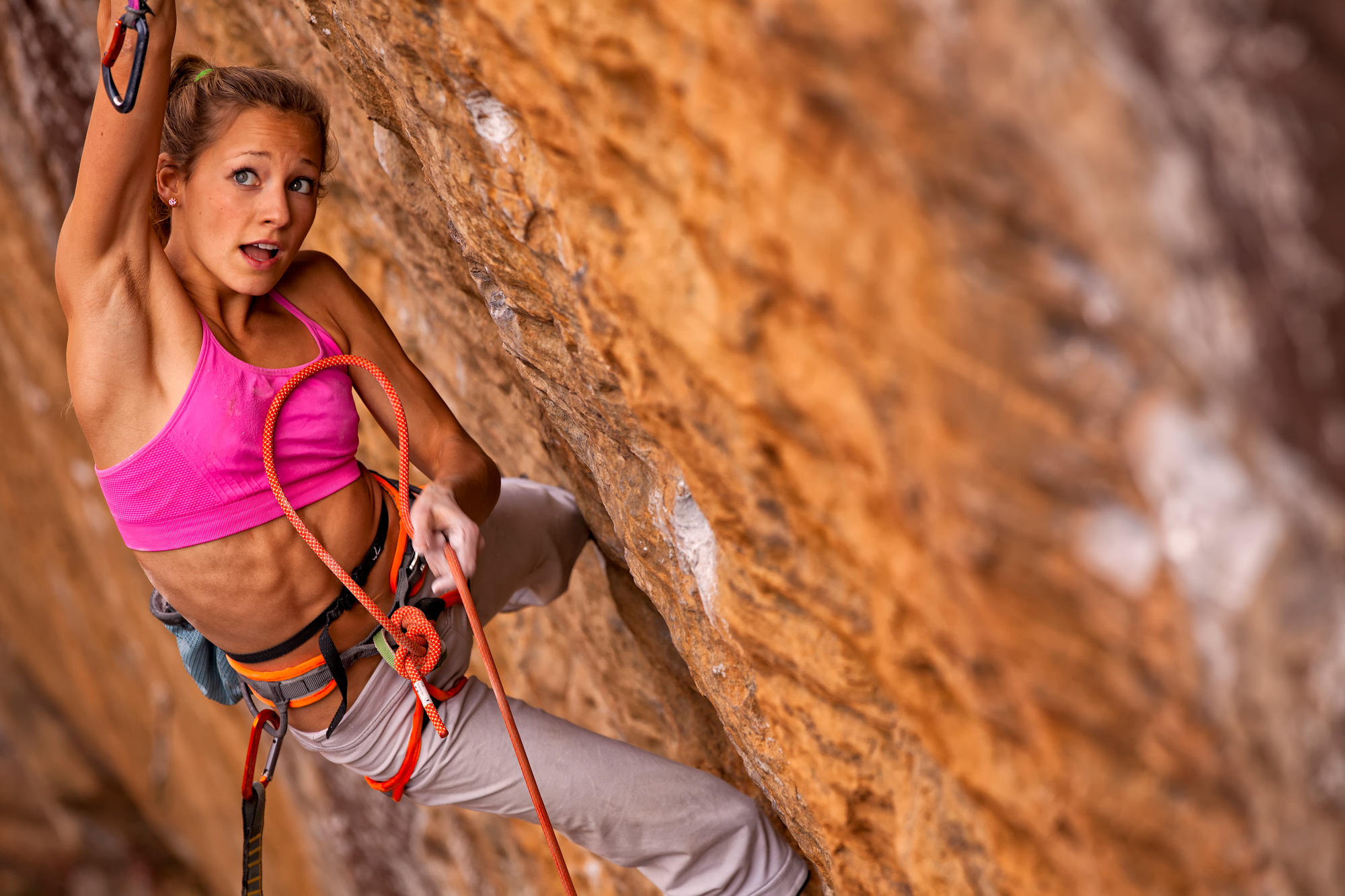It’s a week before fall semester, and Columbia senior Sasha DiGiulian is hanging from a nine-thousand-foot limestone cliff by ten fingers whose nails are painted bright pink. She digs her toes into a crevice that she hopes will hold her. It does, and she propels her five-foot-two frame upward, grasping onto a new ledge.
DiGiulian is now eight inches closer to completing this treacherous route of the Eiger, the fiercest mountain in the Swiss Alps. A sudden gale rips into her, and over the whipping wind she hears an ominous rumble. It could be falling rocks, which over the three-day climb have made her headgear more crater than helmet. Or it could be the reverberations of a helicopter sent with body bags to pick up the remains of a climber who has fallen. The distant rumbling could also mean the return of the storm that had earlier imperiled everyone on the mountain.
DiGiulian and her climbing partner, Carlo Traversi, have to hurry. On the Eiger, outcomes tend to be binary and extreme. Failure would make DiGiulian a statistic, a quick update on the Eiger’s Wikipedia page, climber death number sixty-five.
And if she succeeds?
But DiGiulian can’t think about that right now. Clinging to a rock face nearly two miles off the ground, the furthest thing from her mind is the headline that would inevitably appear if she made it: SASHA DIGIULIAN, 22, FIRST WOMEN TO CONQUER TRAIL OF EIGER'S 'MURDER WALL.'
In truth, achieving a historic first is only a small motivator for DiGiulian. Not that she doesn’t care about breaking gender barriers: DiGiulian has been deeply aware of stereotypes in sports — and especially climbing — since she was six, when a rowdy gaggle of boys at her brother’s birthday party in her hometown of Alexandria, Virginia, watched with mouths agape as Charlie’s little sister strolled into the climbing gym and easily scampered up one of the walls. Sixteen years later, DiGiulian is now a world-champion professional climber and an inspirational speaker who works with the Women’s Sports Foundation to encourage young female athletes. She is also a full-time student, majoring in creative writing.
Still, for DiGiulian, becoming the first woman to scale this notoriously unforgiving trail of Murder Wall is incidental to a larger goal. To her, the story shouldn’t be that a woman conquered a mountain but that a human being conquered the most primal and universal enemy: fear.
It is fear — more than any storm or falling rock — that stalks DiGiulian on the Eiger. On good climbing days, her movements flow like poetry and her mind escapes to a peaceful realm “of just me and the rock.” But the rock isn’t cooperating on day two of her three-day ascent. The loose limestone makes it difficult for her to securely insert the bolts that supports her safety rope.
“I kind of freaked out,” DiGiulian confesses in a video journal she records later that day. “I started thinking only of the danger that we’re going to be dealing with, and I’m kind of scared.”
For DiGiulian, managing fear is a skill as crucial as any climbing technique. She says it starts with a special type of compartmentalization, one where you shift thoughts away from paralyzing what-ifs and direct them instead toward next steps. “You have to have confidence in your next move,” she says.
Her next move after day two is to dig out rock to form a ledge on which she can lie down for some much-needed rest. Sunrise isn’t far off, and a new day means a new opportunity to confront her fear.
Day three is DiGiulian’s summit push. As the air gets thinner and the wet rock turns icier, DiGiulian’s fear crystallizes into focus. With a physical strength gained from her training sessions (six days a week at 6 a.m., before class) she pulls herself up and over the route’s final ridge.
There, high above the world, she looks at the clouds and earth below her. She is awestruck, exhilarated. But she also feels an even more profound satisfaction: somewhere down there, tumbling away down the mountain, are her discarded doubts.
Fear is often the admission price for life’s greatest rewards. That’s why DiGiulian, back on solid ground at Columbia, is already looking for her next scary adventure. It may be an ascent at Yosemite or an ice climb to prepare for the new “mixed climbing” event rumored to be coming to the Olympics.
Regardless of her choice, DiGiulian will paint her fingernails bright pink before the climb. She’ll do this because it’s feminine, because she likes the color, and because it’s a superstition that helps calm her nerves in the face of fear. If the polish chips off during the climb — and it always does — she’ll keep going and repaint her nails after she reaches the top, which she always does.



